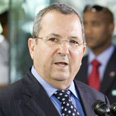
'Coordinated action.' Barak
צילום: רויטרס
Barak to UN chief: No options excluded on Iran atom program
Israeli defense minister tells Ban harsh economic penalties needed against Tehran, Hizbullah rearmament may undermine stability in Lebanon
Israeli Defense Minister Ehud Barak said on Wednesday that tough sanctions should be used to prevent Iran from developing nuclear weapons and added that no options should be excluded.
Speaking to reporters after a meeting with UN Secretary-General Ban Ki-moon, Barak said he told Ban that harsh economic penalties were needed against Tehran.
"We emphasized to the secretary-general our expectation that the world community will take coherent, consulted, coordinated action to put an end to the Iranian action in the area of military nuclear technologies," Barak said.
He added he told Ban, "We believe that no options should be removed in this regard from the table."
Diplomats on the UN Security Council have said the council was unlikely to take firm action anytime soon on a new round of sanctions against Iran and would likely wait until a new US president is in office next year.
The council has already imposed three rounds of sanctions against the Islamic Republic.
'Resolution 1701 not working well enough'
There has been increasing speculation that the United States or Israel could attack Iran's nuclear facilities, which Tehran says are intended solely for the peaceful generation of electricity, although both have said force should be a last resort.
The speculation has caused jitters on oil markets.
When asked about Israeli Prime Minister Ehud Olmert's decision on Wednesday to resign, Barak said, "I think it is a proper and responsible decision made at the right time." Barak leads the Labour Party, Kadima's main coalition ally, and is a former prime minister.
In addition to maintaining a steady policy on Iran, he said the Israeli government would continue with the peace process led by Olmert.
"I think that Israel will continue its basic strategies," he said. "We are trying to do whatever we can to move ahead with the peace process with the Palestinians."
On Lebanon, Barak said he reiterated to Ban his view that that UN Security Council Resolution 1701 was "not working well enough" due to violations by the Lebanese militant Shiite movement Hizbullah with the aid of backers Syria and Iran.
He said the smuggling of arms to Hizbullah continued and risked undermining stability in Lebanon.
Resolution 1701 was adopted on Aug. 11, 2006, ending a 34-day war between Israel and Hizbullah and calling for a cessation of hostilities.
Barak thanked Ban for his assistance in the implementation of the recent prisoner exchange deal between Israel and Hizbulllah, in which the bodies of IDF soldiers Ehud Goldwasser and Eldad Regev were returned in exchange for the release of five Lebanese prisoners and the transfer of the remains of some 200 slain Lebanese gunmen.
The Israeli defense minister updated the UN chief on Israel's efforts to ease restrictions on Palestinians in the West Bank.
Foreign Minister Tzipi Livni is expected to meet Ban in New York on Thursday.
Yitzhak Benhorin contributed to the report










